10 books by Gilbert, Claire
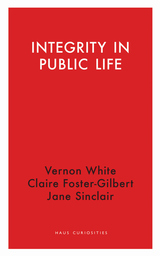
Integrity in Public Life
Vernon White, Claire Foster-Gilbert, and Jane Sinclair
Haus Publishing, 2019
Good governance is a fundamental value in the United Kingdom, and its citizens are entitled to expect that public officials, both elected and non-elected, behave according to the highest standards of ethical behavior. Of course, these aspirations alone are not enough to root out corruption in government. In order for integrity in public life to be maintained, the core principles underlying these expectations must be constantly examined and strengthened. This new volume, published in collaboration with the Westminster Abbey Institute, explores ways in which public service institutions can maintain integrity on both the institutional and the individual level. While keeping the power of the individual in mind, the authors also illustrate the critical role institutions play in upholding values when the moral compass of individuals in power fails. Integrity in Public Life provides an essential guide to integrity, seeking to answer the fundamentals of what integrity means in public life and why it holds such a critical role in the constitution of Britain.
[more]
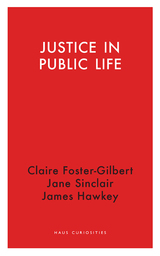
Justice in Public Life
Claire Foster-Gilbert, Jane Sinclair, and James Hawkey
Haus Publishing, 2021
An exploration of the concept of justice, focusing on its place in public service.
The three essays in Justice in Public Life, written by Claire Foster-Gilbert, Jane Sinclair, and James Hawkey, examine the meaning of justice in the twenty-first century, asking how justice can be expressed by our public service institutions and in society more widely. They consider whether justice is tied to truth and whether our idea of justice is skewed when we conflate it with fairness. They also explore how justice as a virtue can help us navigate the complexities of life in economics, in wider society, and in righting wrongs. In addition, their essays consider the threats to a just society, including human nature itself, the inheritance of unjust structures, the wide range of views about what constitutes justice, and the difficulty of establishing it globally and between nation-states. Justice in Public Life brings an often abstract concept to life, calling on public servants to nurture justice as a virtue pursued both individually and communally.
The three essays in Justice in Public Life, written by Claire Foster-Gilbert, Jane Sinclair, and James Hawkey, examine the meaning of justice in the twenty-first century, asking how justice can be expressed by our public service institutions and in society more widely. They consider whether justice is tied to truth and whether our idea of justice is skewed when we conflate it with fairness. They also explore how justice as a virtue can help us navigate the complexities of life in economics, in wider society, and in righting wrongs. In addition, their essays consider the threats to a just society, including human nature itself, the inheritance of unjust structures, the wide range of views about what constitutes justice, and the difficulty of establishing it globally and between nation-states. Justice in Public Life brings an often abstract concept to life, calling on public servants to nurture justice as a virtue pursued both individually and communally.
[more]

Letters from Lockdown
Sustaining Public Service Values During the Covid-19 Pandemic
Claire Foster-Gilbert
Haus Publishing, 2020
During the first months of the coronavirus lockdown, Claire Foster-Gilbert, director of Westminster Abbey Institute, wrote twelve weekly letters to Britain’s public servants. Intended to strengthen their response to the rapidly changing needs of an increasingly unfamiliar world, these letters chart a heroic journey through initial uncertainty and crushing trials toward unprecedented unity and transformed resolve. Rather than bunker down, she asks us to consider: what might we discover, imagine, and change for the better as a result of the pandemic?
Letters from the Lockdown presents the twelve original letters alongside new, deeply personal accounts from public servants on the job. Together, this collection provides an opportunity to reflect on how public values meet practice as the global crisis unfolds.
Letters from the Lockdown presents the twelve original letters alongside new, deeply personal accounts from public servants on the job. Together, this collection provides an opportunity to reflect on how public values meet practice as the global crisis unfolds.
[more]

The Power of Civil Servants
David Normington and Peter Hennessy
Haus Publishing, 2018
Throughout Britain, Civil Servants are exposed to public scrutiny today in unprecedented ways. What does it mean that the political neutrality of the Civil Service has only been enshrined in law since 2010, nearly 150 years after it was first proposed? Why is it so important for politicians to trust Civil Servants (and what difficulties arise when they do not)?
Coauthored by former First Civil Service Commissioner David Normington and historian Peter Hennessy, The Power of Whitehall provides answers through rich observations about the nature of the British Civil Service, its values and effectiveness, and how it should continue to adapt to a changing world.
[more]
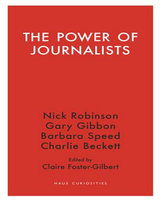
The Power of Journalists
Nick Robinson, Gary Gibbon, Barbara Speed, and Charlie Beckett
Haus Publishing, 2018
We live in a profoundly challenging era for journalists. While the profession has historically taken on the mantle of providing clear, sound information to the public, journalists now face competition from dubious sources online and smear campaigns launched by public figures. In The Power of Journalists, four of the United Kingdom’s foremost journalists—Nick Robinson, Barbara Speed, Charlie Beckett, and Gary Gibbon—give on-the-ground accounts of how they’ve weathered some of the most significant political events of the past five years, including the referendum on Scottish independence and Brexit. These monumental political decisions exposed each journalist to the dangerous vicissitudes of public opinion, and made them all the more certain of their mission. In describing the role of the journalist as truth-teller and protector of impartiality as well as interpreter of controversial facts and trusted source of public opinion, they issue a clarion call for good journalism.
[more]
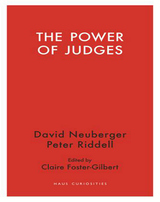
The Power of Judges
David Neuberger and Peter Riddell
Haus Publishing, 2018
To the vast majority of the English public, the role of the United Kingdom’s Supreme Court has often been distant and incomprehensible, its judges a caste apart from society. The Power of Judges ends this mystery, exploring the fundamental concept of justice and explaining the main functions of the courts, the challenges they face, and the complexity of the judicial system.
In this lucid account of the judiciary, David Neuberger and Peter Riddell lead us through an array of topics both philosophical and logistical, including the relationships between morality and law and between Parliament and the judiciary. They explain the effects of cuts in legal aid and shed light on complex and controversial subjects like assisted dying and the complexities of combating mass terrorism while protecting personal liberty. Given that many of these issues span national borders, the book also compares the United Kingdom’s legal system with its counterparts in the United States and Germany.
Full of insights, The Power of Judges is an informative and accessible account of the United Kingdom’s judicial system, its contribution to running the country, and the challenges it faces—including the many threats to its effectiveness.
In this lucid account of the judiciary, David Neuberger and Peter Riddell lead us through an array of topics both philosophical and logistical, including the relationships between morality and law and between Parliament and the judiciary. They explain the effects of cuts in legal aid and shed light on complex and controversial subjects like assisted dying and the complexities of combating mass terrorism while protecting personal liberty. Given that many of these issues span national borders, the book also compares the United Kingdom’s legal system with its counterparts in the United States and Germany.
Full of insights, The Power of Judges is an informative and accessible account of the United Kingdom’s judicial system, its contribution to running the country, and the challenges it faces—including the many threats to its effectiveness.
[more]

The Power of Politicians
Tessa Jowell and Frances D’Souza
Haus Publishing, 2018
The Power of Politicians takes readers inside the workings of Parliament via an autobiographical account of Tessa Jowell’s own experience of entering politics as an MP. Jowell offers fascinating insights into the workings of Parliament and sheds light on the successful pathways for developing policy into final legislation. The details of the inner workings of politics are interwoven with a powerful personal narrative, as Jowell offers a firsthand account of the role of women in contemporary political life.
With former Lord Speaker Frances D’Souza serving as Jowell’s interlocutor, this book provides a passionate and inspiring interpretation on moral duty. Ultimately, The Power of Politicians offers not just a case study of the life and everyday work of a politician, but also attends to deeper questions about what is demanded from the political class. The overall result is a nothing less than a master class in how to be a good politician.
With former Lord Speaker Frances D’Souza serving as Jowell’s interlocutor, this book provides a passionate and inspiring interpretation on moral duty. Ultimately, The Power of Politicians offers not just a case study of the life and everyday work of a politician, but also attends to deeper questions about what is demanded from the political class. The overall result is a nothing less than a master class in how to be a good politician.
[more]

Secret Service
National Security in an Age of Open Information
Jonathan Evans
Haus Publishing, 2020
In Secret Service, former Director Deneral of the British Security Service Jonathan Evans reveals how he balanced two apparently irreconcilable pressures during his tenure with MI5: state secrecy and public transparency. Despite popular perception, Evans argues, these values need not be at odds. Intelligence and the press share many goals, and partnerships formed on these grounds often prove fruitful. In disclosing his methods, Evans compares his approach with other agencies, especially in the United States, and speculates on the UK’s post-Brexit collaborations with European security services. In short, Secret Service presents an on-the-ground picture of life in British intelligence, one that calls us to care for the moral health of both the institution and its operatives.
[more]

Trust in Public Life
James Hawkey, Anthony Ball, Anna Rowlands, and Josie Rourke
Haus Publishing, 2023
A deep and thoughtful reflection on trust in the context of public life.
Trust in Public Life is a collection of essays addressing the importance of trust in public life and how public servants can engender and sustain it. In “The Roots of Trust,” Anna Rowlands argues that our loss of trust is a feature of modernity that can only be solved through encounters with real people. In “Trust in Oneself,” Claire Gilbert makes the case that leaders need to have self-trust and confidence to rule. In “Trust in Institutions,” Anthony Ball offers a guide to rebuilding trust in institutions through four virtues: honesty, humility, compassion, and competence. Finally, in “Trust in People,” James Hawkey argues that trust between groups is a choice, not something that can be injected like a vaccine. Together, the essays offer valuable reflections on trust in public life, agreeing that it must be engendered, and offer guidance on how this might be achieved.
Trust in Public Life is a collection of essays addressing the importance of trust in public life and how public servants can engender and sustain it. In “The Roots of Trust,” Anna Rowlands argues that our loss of trust is a feature of modernity that can only be solved through encounters with real people. In “Trust in Oneself,” Claire Gilbert makes the case that leaders need to have self-trust and confidence to rule. In “Trust in Institutions,” Anthony Ball offers a guide to rebuilding trust in institutions through four virtues: honesty, humility, compassion, and competence. Finally, in “Trust in People,” James Hawkey argues that trust between groups is a choice, not something that can be injected like a vaccine. Together, the essays offer valuable reflections on trust in public life, agreeing that it must be engendered, and offer guidance on how this might be achieved.
[more]
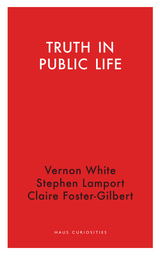
Truth in Public Life
Vernon White, Stephen Lamport, and Claire Foster-Gilbert
Haus Publishing, 2020
In Truth in Public Life, three public servants—a theologian, an economist, and an ethicist—contend for both the existence and moral imperatives of absolute truth. Each argues that society, built on ethical leadership and communal accountability, cannot be sustained without a widespread commitment to objectivity. This commitment begins at the top: policymakers must resist political expediency, judges must believe victims, journalists must embrace complexity, and the public must hold its leaders accountable to consistent, ethical standards. This short book offers a potent reminder that in a world of fake news, state lies, and echo chambers, the truth matters more than ever. For our public institutions to survive, we must define and protect the truth against all comers
[more]
READERS
Browse our collection.
PUBLISHERS
See BiblioVault's publisher services.
STUDENT SERVICES
Files for college accessibility offices.
UChicago Accessibility Resources
home | accessibility | search | about | contact us
BiblioVault ® 2001 - 2024
The University of Chicago Press









